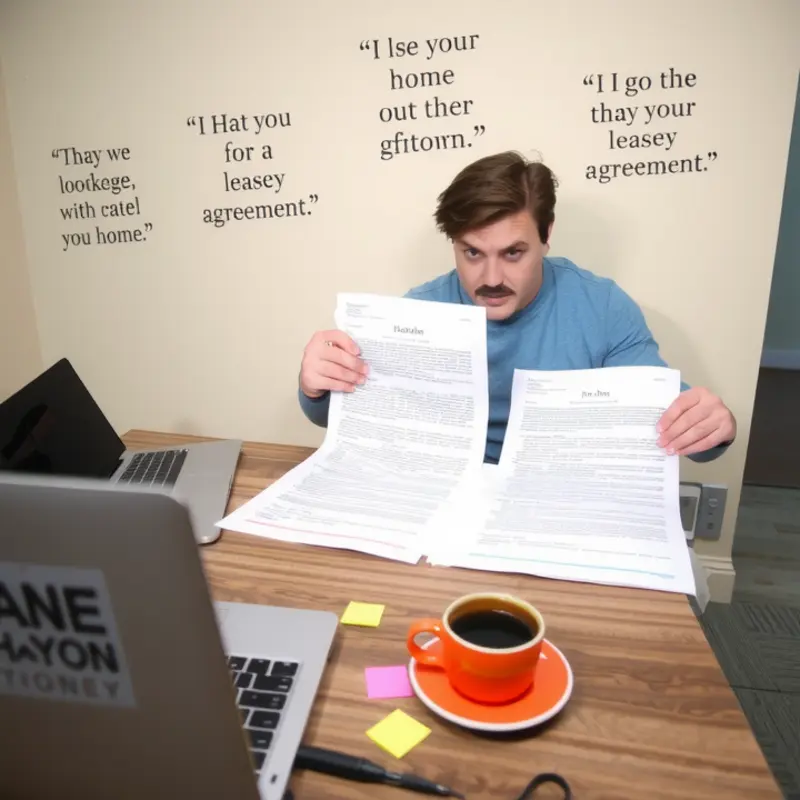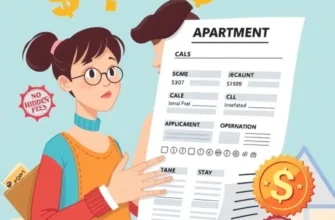Ah, the thrill of renting your first apartment or cozy home! It’s like handpicking a slice of freedom among the many available options. But hold your horses! Before you dive into moving boxes and Pinterest boards, you’ll need to untangle the often-daunting lease agreement. Think of the lease as a guideline for your future home – a guide that can make or break your renting experience. Whether you’re a young professional eager to escape the family nest, a couple setting up your love nest, or a family searching for that perfect backyard, understanding lease terms is essential. The fine print can seem dense and intimidating, but no one wants to be that person paying for a secret pet fee or getting caught in a tricky subletting condition. So, buckle up as we decode these lease terms into bite-sized, digestible pieces of important info. Get ready to empower yourself and stride confidently into your new chapter of renting!
Decoding the Lease: Must-Know Terms

Decoding your lease agreement is pivotal in ensuring a stress-free renting experience. Let’s break down the vital terms you need to know.
Lease Duration: This specifies the length of time you’re committing to live in the rental. Most leases last for 12 months, but terms can vary. Some leases offer month-to-month arrangements, providing more flexibility but less stability.
Rent: Perhaps the most obvious term, it’s crucial to know the exact amount due each month and what it covers. Some rents include utilities, while others do not. Make sure to clarify this with your landlord.
Security Deposit: This upfront payment is a safeguard for landlords against potential damages or unpaid rent. Laws usually cap the amount you’re required to pay. Learn more about how to manage your apartment security deposits to ensure you’re prepared.
Maintenance Responsibilities: Understand who takes care of what around the apartment. Landlords generally handle structural repairs, but you may be responsible for minor repairs, such as changing light bulbs or unclogging drains. Knowing your duties can prevent unnecessary disputes.
Termination Clause: This section explains how and under what conditions the lease can be ended by either party. The lease may include penalties for ending early, or it might specify necessary notice periods.
Subletting Policy: If you think you might need to leave temporarily, the subletting policy is crucial. Some landlords allow it with approval, while others prohibit it entirely.
Pet Policy: If you have a pet or plan on getting one, make sure pets are permitted. Policies will outline any additional fees or breed restrictions.
Late Fees and Grace Periods: This covers penalties for missed deadlines. Some landlords allow a grace period before charging fees, while others do not. Always be aware of these policies to avoid unnecessary fines.
Utilities and Services Included: A lease should clearly list which utilities you’ll need to pay. This typically includes electricity, gas, and sometimes water or internet.
Tenant Privacy Rights: It’s important to be aware of your privacy rights and what access your landlord has to your space. Our guide on tenant privacy rights is a valuable resource.
Familiarizing yourself with these terms will greatly enhance your confidence in lease discussions. Leases might seem daunting, but understanding these essentials transforms legalese into comprehensible language. You’re now equipped to engage wisely with landlords and ensure your living conditions match your expectations.
Negotiation and Understanding Your Leverage

You’ve done your homework, and now you’re ready to enter the negotiating ring. With a firm grasp of lease terms, it’s time to assert yourself without breaking a sweat. Whether you’re a first-time renter or a seasoned lessee, understanding where you can push back is crucial.
Let’s unpack the power dynamics. Often, rent is seen as non-negotiable, but many landlords are willing to consider adjustments, especially if you’re committing to a longer lease term or have a strong rental history. Showcase your reliability and good rental record—it’s your strongest asset in negotiations. You can refer to this guide on reviewing your rental history report to ensure your background supports your case.
Apart from the price, scrutinize other clauses like pet policies. If you have a pet, examine these rules closely. Some landlords may waive pet fees or adjust pet restrictions, particularly if you can demonstrate a history of responsible pet ownership. It never hurts to ask for a trial period where your pet can live with you, providing a chance to show there are no issues.
Maintenance responsibilities often cause contention. Doubtful about taking on extra tasks or costs? Push back here. Outline your willingness to maintain the property’s condition without being responsible for repairs typically managed by the landlord. Clarity here can prevent future misunderstandings and additional expenses on your end.
For negotiation success, keep these tips in mind:
- Be Prepared: Have all your documents ready. This includes proof of income, references, and a spotless rental history.
- Know Your Market: Research local rental rates and conditions. This data will bolster your bargaining position.
- Communicate Clearly: Approach negotiations with a calm, clear stance. State your needs directly and be ready to listen.
- Leverage Timing: Time your negotiation when landlords are more flexible, like the off-peak rental season.
- Craft Win-Win Scenarios: Show how adjustments benefit both parties. Emphasize long-term tenancies, which reduce their turnover costs.
Finally, remember negotiations aren’t just a financial tug-of-war. It’s about crafting an agreement aligned with your lifestyle needs. Whether securing a pet-friendly haven or ensuring maintenance obligations are clear and fair, you’re not just closing a deal—you’re setting the stage for a harmonious living experience that feels like home. Wield your knowledge wisely, and soon, what feels right for you will feel like more than just a rental—it will feel like yours.
Final words
Getting your first lease is like getting a seat at the grown-up table; it’s exciting, but it comes with responsibility. Understanding the terms laid out in your lease can save you from hidden surprises and make your renting experience not just enjoyable but secure. So take the time to digest these terms, negotiate wisely, and remember: the lease is not just a piece of paper; it’s your first step in creating a home. Now, go forth and conquer the renting world, armed with knowledge and confidence!









